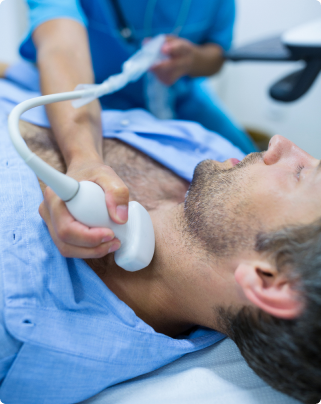Introduction: Understanding Thyroid Nodules
Thyroid nodules are abnormal growths that form within the thyroid gland, a small, butterfly-shaped organ located in your neck. While many thyroid nodules are benign (non-cancerous), some can be malignant (cancerous) or cause complications related to thyroid hormone production. For these reasons, early detection and appropriate management of thyroid nodules are essential for maintaining your thyroid health.
At Aura Endocrine and Diabetes, we specialize in the evaluation, diagnosis, and treatment of thyroid nodules using advanced diagnostic tools such as thyroid ultrasound and thyroid nodule biopsies. In this blog, we will explore what thyroid nodules are, how they’re diagnosed, and the various treatment options available.
What Are Thyroid Nodules?
A thyroid nodule is a lump that forms within the thyroid gland. Nodules can vary in size and may be solid or fluid-filled (cystic). Many people develop thyroid nodules at some point in their lives, and the majority of them are benign. However, nodules that grow larger or show suspicious characteristics need to be evaluated to rule out thyroid cancer.
Types of Thyroid Nodules:
- Benign Nodules: Non-cancerous nodules that don’t typically cause harm. These can be left untreated but monitored for growth.
- Malignant Nodules: Nodules that are cancerous and need treatment.
- Thyroid Cysts: Fluid-filled nodules that are usually benign.
- Hot Nodules: Nodules that produce excess thyroid hormone, leading to hyperthyroidism.
- Cold Nodules: Nodules that do not produce thyroid hormone and may require a biopsy for evaluation.
Symptoms of Thyroid Nodules
Many thyroid nodules do not cause symptoms and are discovered during routine physical exams or imaging tests for other conditions. However, in some cases, thyroid nodules can cause symptoms, especially if they grow larger or affect thyroid hormone production.

Common Symptoms of Thyroid Nodules:
- A visible lump in the neck
- Difficulty swallowing or breathing
- Hoarseness or changes in the voice
- Hyperthyroidism symptoms (if the nodule produces excess hormone), such as rapid heartbeat, weight loss, or nervousness
- Hypothyroidism symptoms (if the nodule disrupts hormone production), such as fatigue, weight gain, and cold intolerance
If you experience any of these symptoms, it’s essential to consult a thyroid specialist at Aura for further evaluation.
How Are Thyroid Nodules Diagnosed?
Diagnosing thyroid nodules involves a combination of physical exams, imaging tests, and, if necessary, a biopsy to determine whether the nodules are benign or malignant.
1. Thyroid Ultrasound
A thyroid ultrasound is the most common imaging test used to evaluate the size, shape, and structure of the nodule. Ultrasound provides detailed images that allow your doctor to determine whether the nodule is solid or cystic and to assess whether it has any suspicious features.
Benefits of Thyroid Ultrasound:
- Non-invasive and painless
- Provides clear images of the thyroid and any nodules present
- Helps guide biopsies for accurate tissue sampling
At Aura Endocrine and Diabetes, we offer in-house thyroid ultrasounds, allowing us to provide a complete evaluation during your visit.
2. Fine-Needle Aspiration (FNA) Biopsy
If the ultrasound reveals that a nodule has suspicious characteristics, a fine-needle aspiration (FNA) biopsy may be performed. This minimally invasive procedure involves inserting a thin needle into the nodule to collect a small tissue sample. The sample is then analyzed to determine whether the nodule is benign or malignant.
ECNU-Certified Expertise:
At Aura, Dr. Igala is ECNU-certified (Endocrine Certification in Neck Ultrasound), ensuring that all biopsies and ultrasounds are performed with the highest level of accuracy and precision.
3. Blood Tests
In some cases, your doctor may order blood tests to evaluate your thyroid hormone levels and check for markers of thyroid dysfunction. These tests help assess whether the nodule is affecting your overall thyroid function.
When Should Thyroid Nodules Be Treated?
Most benign nodules do not require immediate treatment but will need to be monitored for any changes in size or symptoms. However, nodules that are causing discomfort, affecting your hormone levels, or showing signs of malignancy may require treatment.
Reasons for Treatment:
- Malignant nodules: Nodules confirmed to be cancerous need immediate treatment.
- Large nodules: Nodules that grow large enough to cause discomfort or interfere with swallowing or breathing.
- Hormone-producing nodules: Nodules that produce excess thyroid hormone, leading to hyperthyroidism, often require treatment.
Treatment Options for Thyroid Nodules
1. Observation and Monitoring
For benign nodules, your doctor may recommend watchful waiting. This means regular ultrasound exams to monitor the size and appearance of the nodule over time. If the nodule grows or changes, further evaluation may be needed.
2. Radioactive Iodine Therapy
For nodules that cause hyperthyroidism, radioactive iodine therapy may be used to shrink the nodules and reduce hormone production. This treatment is often used when nodules are overproducing thyroid hormone and causing symptoms.
3. Thyroid Surgery
If the nodule is confirmed to be malignant or is causing significant symptoms, surgery may be necessary. A thyroidectomy involves removing part or all of the thyroid gland, depending on the size and nature of the nodule. In cases of thyroid cancer, surgery may be followed by radioactive iodine treatment to eliminate any remaining cancer cells, depending on your staging.

At Aura, we provide referrals to skilled surgeons when surgery is needed and coordinate post-operative care to ensure a smooth recovery.
Thyroid Cancer: Early Detection Saves Lives
Thyroid cancer is one of the most treatable forms of cancer. The most common types of thyroid cancer are papillary and follicular thyroid cancer. Both have high survival rates when detected and treated in the early stages.
Symptoms of Thyroid Cancer:
- A hard lump in the thyroid
- Swollen lymph nodes in the neck
- Persistent hoarseness or difficulty swallowing
Early detection through thyroid ultrasound and FNA biopsy is key to managing thyroid cancer effectively. If thyroid cancer is diagnosed, treatment usually involves surgery followed by radioactive iodine therapy to eliminate any remaining cancerous tissue.
Why Early Detection Matters
The earlier thyroid nodules are detected and evaluated, the better the outcomes for patients. Whether benign or malignant, early diagnosis allows for more treatment options and reduces the risk of complications. At Aura Endocrine and Diabetes, we are committed to providing thorough and accurate diagnoses using advanced tools and techniques.
Conclusion: Prioritize Your Thyroid Health
If you’ve noticed a lump in your neck or are experiencing symptoms of a thyroid nodule, don’t wait to seek evaluation. At Aura Endocrine and Diabetes, we offer comprehensive care for thyroid health, from thyroid ultrasounds and biopsies to personalized treatment plans for benign and malignant nodules.
Schedule an appointment with our expert team today and take the first step toward better thyroid health.
Call to Action (CTA):Concerned about a thyroid nodule? Contact Aura Endocrine and Diabetes today for a thorough evaluation and personalized treatment plan.




